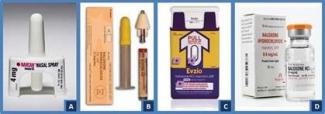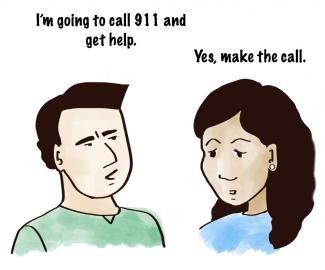Overdose/Rescue Strategies and Naloxone Information
Symptoms of an Overdose
- Can't be woken up
- Slow or no breathing
- Limp body
- Fingernails or lips turning blue
- Unable to speak or incoherent
- Vomiting or gurgling noises
- Overdoses can happen right after using, but they usually occur in 1-2 hours
If you suspect an overdose:
- CALL 911
- Tell them that someone is not breathing
- Give an accurate description of your location
- Give naloxone if you have it, and perform rescue breathing
- Continue rescue breathing
- Stay with the person until help arrives
- If you have to leave, roll the person on their side
- Assist with follow-up care: getting to the ER
Rescue Breathing:
- Tilt the persons head back
- Pinch nose
- Seal your mouth over theirs (use a barrier device if you have one)
- Give 1 breath every 5 seconds
- Keep going until help arrives or the person starts breathing on their own
Click here for an infographic on how recognize and respond to an overdose.
Naloxone
- For more information about Naloxone, please click here
- Naloxone reverses the effects of opioids but will not harm someone who has not taken opioids.
- When in doubt, give it
- Naloxone starts working in 3-5 minutes and lasts for 30-90 minutes
- A: Narcan Nasal Spray
- B: Generic Narcan Nasal Spray
- C: EVZIO auto injector
- D: Naloxone intramuscular injection

The Naloxone and Overdose Prevention Education Program of Rhode Island, NOPE-RI, is a program of the RI Disaster Medical Assistance Team and Medical Reserve Corps (RI DMAT/MRC). We recruit, train, and deploy volunteers to educate Rhode Islanders about addiction, overdose prevention, and the use of naloxone (Narcan).
We collaborate with strategic partners across the state in order to address these issues, including HEALTH, BHDDH, DOC (Department of Corrections), State Police, municipal law enforcement, URI, Lifespan, and other not-for-profit organizations. With a focus on public safety and healthcare professionals, we create and compile training curricula and resource material that helps agencies, organizations, and individuals implement simple, cost-effective, evidence-based strategies to fight the epidemic of opioid abuse and overdose.
Our programming includes overdose prevention, recognition, and response training, specifically targeted towards law enforcement and public safety professionals, primary care providers, behavioral healthcare providers, corrections, and others.
Training Materials and Videos
Overdose training and naloxone distribution can be done just about anywhere people ask for it. Here are some short and longer format naloxone trainings, as well as videos which you may find helpful.
RI State's 9-1-1 Good Samaritan/Overdose Law.

Under this law:
- Bystanders are allowed to carry and administer naloxone if they suspect an overdose.
- No one who tries to help in an overdose can be prosecuted for having a small amount of medication or drugs.
- The overdose victim is also protected.
- The law, however, does not protect you or the overdose victim from other crimes or warrants.